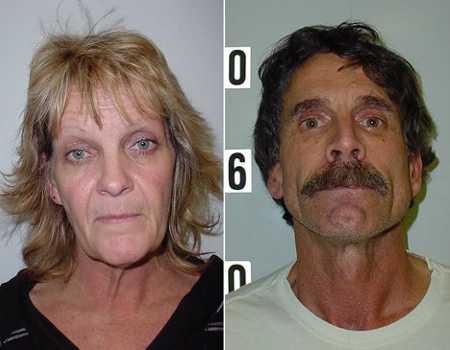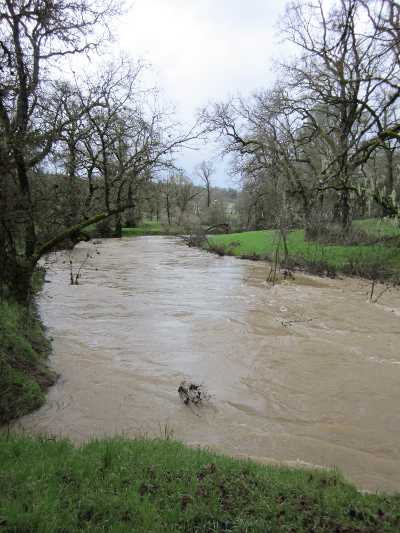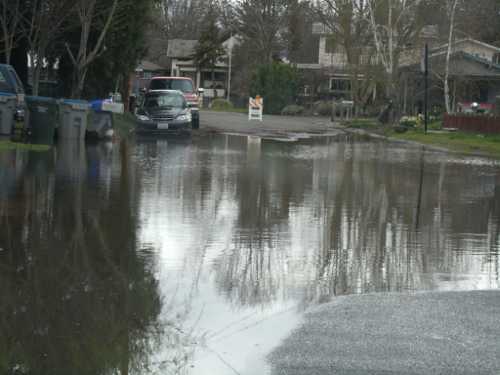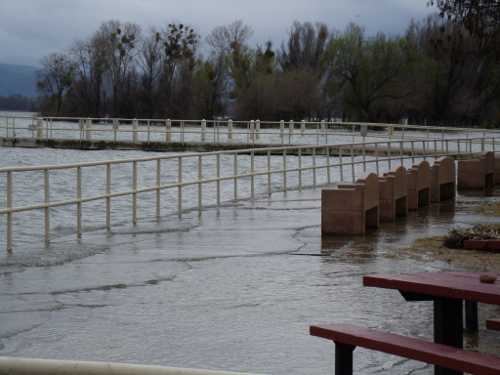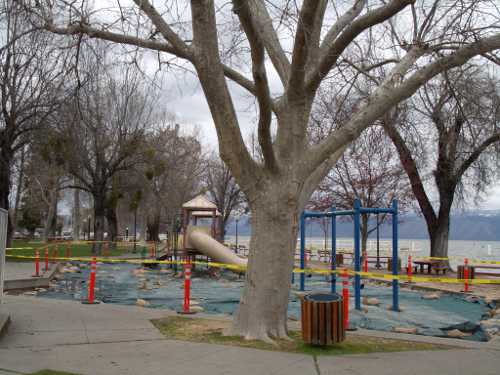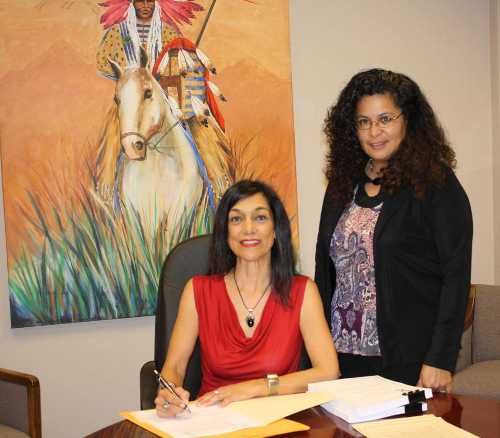
Habematolel Chair Sherry Treppa (seated) and Vice Chair Angelina Arroyo have worked steadily to get the gaming compact with the state of California approved. Here the tribe executives the agreement on Wednesday, March 9, 2011. Courtesy photo.
UPPER LAKE, Calif. – Seven months after it had its compact with the state turned down by the Department of the Interior, the Habematolel Pomo of Upper Lake have signed a new compact with California's new governor, clearing the way for groundbreaking on a new casino this spring.
“It is huge for the tribe, it really is,” Habematolel Chair Sherry Treppa said Wednesday.
It's also the first Indian compact negotiated and signed by Gov. Jerry Brown.
The new compact will run through Dec. 31, 2031, and supersedes the 2009 compact the tribe signed with Gov. Arnold Schwarzenegger, Brown's office reported.
Treppa said the 33,000 square foot sprung structure will be erected outside of Upper Lake on an 11.24-acre parcel next to the county park on Highway 20.
The facility will include a gaming floor complete with 349 machines, six game tables, sitdown and fast food restaurants, a cocktail lounge, retail shops, a players club and administrative offices, Treppa said. Previous project cost estimates have been at $25 million.
It would be part of a phased project that would include a hotel and would eventually encompass a total of 76,750 square feet, according to a tribal fact sheet.
The tribe plans to open with 349 slot machines, Treppa said, with the compact allowing the tribe to have a maximum of 750 machines at one facility, which is set to create more than 145 new jobs.
The compact's signing marks the latest milestone in the 216-member tribe's effort to open its own casino, which last summer hit an obstacle because of the original compact's terms.
Last August the Department of Interior found the 2009 compact too onerous in its revenue sharing requirements, disapproving the document after ruling that it violated the Indian Gaming Regulatory Act.
That agreement, said Treppa, would have required the tribe to follow 15-percent revenue sharing on its annual wins for all of its machines.
Because of the debt the tribe would have incurred, “We had to scale back the project twice,” she said, adding that the Schwarzenegger administration “squeezed the life out of us.”
The tribe had to essentially start the process over, going back to its lenders and contractors, the local government districts with which it had reached agreements, and even the chambers of commerce to update them on the situation, she said.
“There were some dicey days in regard to keeping the funding we had,” Treppa said.
They then began the compact negotiation process again, working with the new governor, who both Treppa and the tribe's Sacramento-based attorney, Richard Armstrong with Rosette & Associates, said was markedly different in his approach.
The governor corrected the Indian Gaming Regulatory Act violations of the prior administration, and treated the tribe with fundamental fairness and respect, Armstrong said.
“It was a true government to government negotiation,” said Treppa. “They were extremely respectful of us and our time frame.”
She lauded Jacob Appelsmith, a senior advisor to Brown, for his respectful work with the tribe.
The main difference between the 2009 and 2011 compacts, said Treppa, is the revenue sharing requirements.
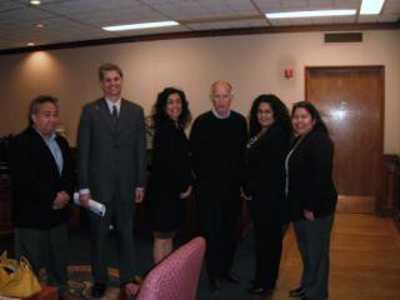
From left, interim Habematolel Executive Council Secretary David Tomas; Jacob Appelsmith, senior advisor to Governor Jerry Brown; Habematolel Chairperson Sherry Treppa; Governor Jerry Brown; Vice Chairperson Angelina Arroyo, Member-At-Large Martina Jackson gather on on Monday, March 21, 2011, the day the tribe picked up the compact. Courtesy photo.
Under the compact signed with Brown, the Habematolel have a tiered revenue sharing structure with the state, she said.
The tribe will not be required to pay any revenue sharing on the first 350 machines, with a 7 percent revenue sharing requirement of its net win for machines 351 to 600 and 15 percent from 601 to 750, according to the compact's terms.
In addition, the document states that the tribe will annually pay the state Revenue Sharing Transfer Fund $900 for every machine from 351 to 750.
Treppa said the agreement with Brown makes the casino project viable.
“It's only under the expansion scenario that we'll have to pay that level of revenue share, which is a lot more reasonable,” Treppa said.
The net win proceeds will be paid to the legislatively controlled Special Distribution Fund, which provides grant funds to local communities for mitigation of local impacts of gaming, funding for the California Gambling Control Commission and Bureau of Gambling Control, as well as provides funding for problem-gambling prevention, the tribe reported. The nonmonetary aspects of the compact are consistent with prior compacts entered into by the state.
Brown's office said the document also includes provisions to protect employees and patrons, and measures that the tribe must take to protect the environment during the construction and operation of gaming facilities.
The compact requires regular audits of gaming operations, the governor's office said.
With the signed compact now in hand, the tribe still has several steps to go, including ratification by the state Legislature. Treppa said Assemblyman Wes Chesbro will carry the bill for the tribe. She credited Chesbro and his staff for being “phenomenal” in their assistance throughout the process.
Treppa expects the legislation could be approved within a month.
Once it's past the Legislature, the compact will go back to the Department of Interior for approval. Treppa believes the new document will not take the full 45-day approval process to be approved in this second attempt.
“We do have an expectation that they will expeditiously approve it,” she said.
Once the Department of Interior has approved the compact, building the casino can begin, said Treppa.
“I am so certain that we're going to be in the ground in the spring,” which will help the tribe fulfill its obligations to its contractor, Treppa said.
The tribe has overcome a lot of obstacles in pursuing its casino, a process which Treppa believes has become more difficult due to the “hot button” nature of gaming.
“It's amazing that we've gotten to this point,” Treppa said.
The tribe has received high marks from local governments and agencies for its efforts to work cooperatively.
“The tribe has gone well beyond the county of Lake’s expectations in its extraordinary efforts to include county officials and the community at-large in the preparation and planning of its gaming project, over a period of several years,” said County Administrative Officer Kelly Cox.
Habematolel entered into a local intergovernmental agreement with the county of Lake in 2006 to help mitigate the operations impacts on the community.
The tribe also formed a fire and emergency service agreement with the Northshore Fire Protection District to provide an annual payment of $80,000 to the fire district to offset the cost of potential service calls the district may make to the tribe’s casino.
In 2008, Habematolel invested $378,000 with the Lake County Special Districts for wastewater system improvements and service to the proposed facility.
“This tribe has done everything possible to ensure that its gaming project will benefit our community and that there will be a long-standing positive working relationship between the tribe and the county of Lake,” said Special Districts Administrator Mark Dellinger.
In 2009, the tribe and Caltrans completed a safety corridor improvement project along Highway 20 just east of Upper Lake, which provided over $500,000 in highway safety improvements including safety lighting, lane widening, bike lanes and sidewalks, according to the tribe.
In addition to the numerous intergovernmental agreements, the tribe said it has worked cooperatively with the county to ensure the Middle Creek Flood Protection Project adjacent to the casino site will not be impeded in any manner with the construction of the casino.
As part of that effort, Habematolel set aside more than 55 acres that will eventually be turned over to the county of Lake as part of the joint flood protection project.
To view the compact and related appendix please visit http://gov.ca.gov/docs/Compact-3_22_11.pdf .
E-mail Elizabeth Larson at This email address is being protected from spambots. You need JavaScript enabled to view it.. Follow Lake County News on Twitter at http://twitter.com/LakeCoNews, on Facebook at http://www.facebook.com/pages/Lake-County-News/143156775604?ref=mf and on YouTube at http://www.youtube.com/user/LakeCoNews.




